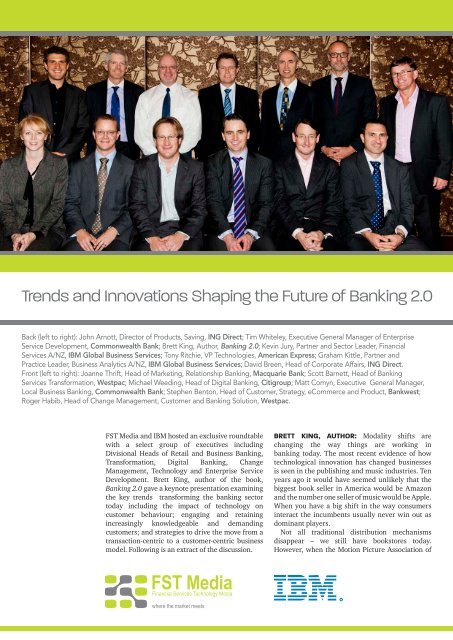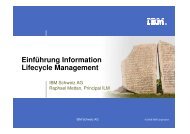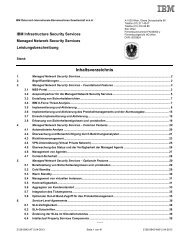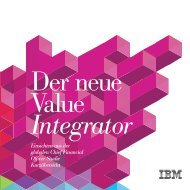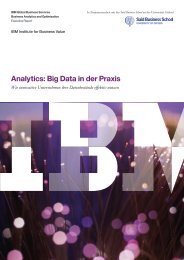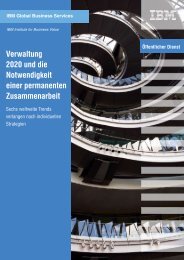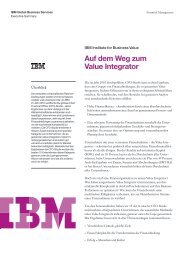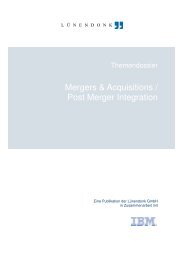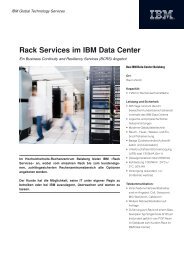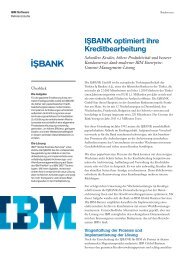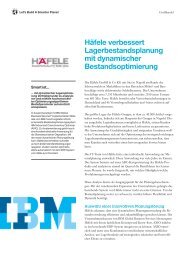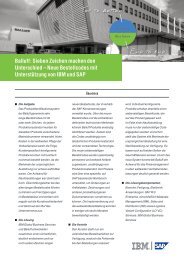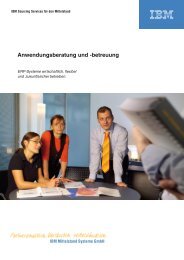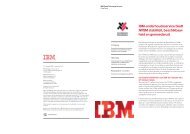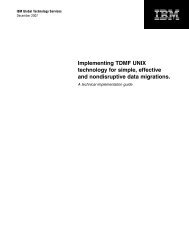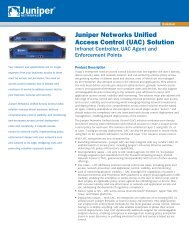Trends and Innovations Shaping the Future of Banking 2.0 - IBM
Trends and Innovations Shaping the Future of Banking 2.0 - IBM
Trends and Innovations Shaping the Future of Banking 2.0 - IBM
You also want an ePaper? Increase the reach of your titles
YUMPU automatically turns print PDFs into web optimized ePapers that Google loves.
<strong>Trends</strong> <strong>and</strong> <strong>Innovations</strong> <strong>Shaping</strong> <strong>the</strong> <strong>Future</strong> <strong>of</strong> <strong>Banking</strong> <strong>2.0</strong><br />
Back (left to right): John Arnott, Director <strong>of</strong> Products, Saving, ING Direct; Tim Whiteley, Executive General Manager <strong>of</strong> Enterprise<br />
Service Development, Commonwealth Bank; Brett King, Author, <strong>Banking</strong> <strong>2.0</strong>; Kevin Jury, Partner <strong>and</strong> Sector Leader, Financial<br />
Services A/NZ, <strong>IBM</strong> Global Business Services; Tony Ritchie, VP Technologies, American Express; Graham Kittle, Partner <strong>and</strong><br />
Practice Leader, Business Analytics A/NZ, <strong>IBM</strong> Global Business Services; David Breen, Head <strong>of</strong> Corporate Affairs, ING Direct.<br />
Front (left to right): Joanne Thrift, Head <strong>of</strong> Marketing, Relationship <strong>Banking</strong>, Macquarie Bank; Scott Barnett, Head <strong>of</strong> <strong>Banking</strong><br />
Services Transformation, Westpac; Michael Weeding, Head <strong>of</strong> Digital <strong>Banking</strong>, Citigroup; Matt Comyn, Executive General Manager,<br />
Local Business <strong>Banking</strong>, Commonwealth Bank; Stephen Benton, Head <strong>of</strong> Customer, Strategy, eCommerce <strong>and</strong> Product, Bankwest;<br />
Roger Habib, Head <strong>of</strong> Change Management, Customer <strong>and</strong> <strong>Banking</strong> Solution, Westpac.<br />
FST Media <strong>and</strong> <strong>IBM</strong> hosted an exclusive roundtable<br />
with a select group <strong>of</strong> executives including<br />
Divisional Heads <strong>of</strong> Retail <strong>and</strong> Business <strong>Banking</strong>,<br />
Transformation, Digital <strong>Banking</strong>, Change<br />
Management, Technology <strong>and</strong> Enterprise Service<br />
Development. Brett King, author <strong>of</strong> <strong>the</strong> book,<br />
<strong>Banking</strong> <strong>2.0</strong> gave a keynote presentation examining<br />
<strong>the</strong> key trends transforming <strong>the</strong> banking sector<br />
today including <strong>the</strong> impact <strong>of</strong> technology on<br />
customer behaviour; engaging <strong>and</strong> retaining<br />
increasingly knowledgeable <strong>and</strong> dem<strong>and</strong>ing<br />
customers; <strong>and</strong> strategies to drive <strong>the</strong> move from a<br />
transaction-centric to a customer-centric business<br />
model. Following is an extract <strong>of</strong> <strong>the</strong> discussion.<br />
Financial Services Technology Media<br />
where <strong>the</strong> market meets<br />
Brett King, Author: Modality shifts are<br />
changing <strong>the</strong> way things are working in<br />
banking today. The most recent evidence <strong>of</strong> how<br />
technological innovation has changed businesses<br />
is seen in <strong>the</strong> publishing <strong>and</strong> music industries. Ten<br />
years ago it would have seemed unlikely that <strong>the</strong><br />
biggest book seller in America would be Amazon<br />
<strong>and</strong> <strong>the</strong> number one seller <strong>of</strong> music would be Apple.<br />
When you have a big shift in <strong>the</strong> way consumers<br />
interact <strong>the</strong> incumbents usually never win out as<br />
dominant players.<br />
Not all traditional distribution mechanisms<br />
disappear – we still have bookstores today.<br />
However, when <strong>the</strong> Motion Picture Association <strong>of</strong>
trends And innovAtions shAping <strong>the</strong> <strong>Future</strong> oF BAnKing <strong>2.0</strong><br />
“What is <strong>the</strong> relevance<br />
today <strong>of</strong> <strong>the</strong> customer<br />
experience <strong>and</strong> our<br />
ability to influence that<br />
end-to-end?”<br />
– Graham Kittle, <strong>IBM</strong><br />
Global Business Services<br />
2<br />
America <strong>and</strong> <strong>the</strong> Recording Industry Association <strong>of</strong><br />
America were initially confronted with a modality<br />
shift <strong>the</strong>ir reaction was to try <strong>and</strong> stop it happening.<br />
They went after Napster <strong>and</strong> file sharing sites but<br />
that didn’t stop people changing <strong>the</strong>ir behaviour.<br />
When a legitimately better process came along<br />
it was rapidly adopted <strong>and</strong> worked well. When<br />
changes in modality occur, those that resist <strong>the</strong><br />
change don’t fare well <strong>and</strong> <strong>the</strong> change happens<br />
anyhow. Bankers now realise that things are going<br />
to be different moving forward. The financial crisis<br />
may have actually helped us. Without an impetus<br />
to change internally within <strong>the</strong> sector it’s likely that<br />
organisations like Google, Apple, PayPal, Square<br />
<strong>and</strong> M-PESA in Kenya will dominate <strong>the</strong> customer<br />
experience. If that happens, we may still have a few<br />
bank branches but <strong>the</strong>y will no longer service <strong>the</strong><br />
dominant behaviour, which will be owned by new<br />
market participants.<br />
The knee-jerk reaction is that this won’t happen<br />
with banking because <strong>the</strong> regulators won’t allow<br />
it. I disagree. In Australia, which prides itself on<br />
being at <strong>the</strong> forefront <strong>of</strong> banking technology, <strong>the</strong><br />
regulators can’t afford to let banks slip behind how<br />
customers access banking services. The regulators’<br />
role is not to stop innovation, but to protect <strong>the</strong><br />
market. Take Google Wallet – <strong>the</strong> regulators are<br />
not going to say this is a risk to <strong>the</strong> banking sector<br />
in Australia. They are likely to see it as inevitable<br />
<strong>and</strong> determine how Australian banks can play in<br />
<strong>the</strong> mobile payments ecosystem, how to support<br />
contactless point <strong>of</strong> sales <strong>and</strong> how to h<strong>and</strong>le Google<br />
or Square in <strong>the</strong> market. They may encourage <strong>the</strong><br />
incumbent players to work out a mobile payment<br />
solution <strong>the</strong>mselves <strong>and</strong> partner with Telstra <strong>and</strong><br />
with EFTPOS, BPAY <strong>and</strong> PayPal.<br />
When new paradigms come out, everyone initially<br />
wants to own <strong>the</strong> space, but with modality you can’t.<br />
Mobile banking is already a mainstream contender<br />
in Australia. St George recently reported that <strong>the</strong>ir<br />
daily mobile transactions are <strong>the</strong> equivalent <strong>of</strong><br />
<strong>the</strong>ir top forty branches. Take mobile banking as<br />
an example; no-one owns that space, although if<br />
you want your customers to have access to mobile<br />
banking you might have to ask Google <strong>and</strong> Apple<br />
for permission to use <strong>the</strong>ir app stores today. So who<br />
owns <strong>the</strong> customer?<br />
Disintermediation, this separation between <strong>the</strong><br />
manufacturing, risk management <strong>and</strong> distribution<br />
<strong>of</strong> products, is already starting. There are many<br />
new entrants in <strong>the</strong> retail financial services space<br />
<strong>and</strong> it’s not realistic to try <strong>and</strong> stop that happening.<br />
The approach should be a strategy for open<br />
partnerships to maximise reach to customers <strong>and</strong><br />
provide products in <strong>the</strong> easiest, most seamless,<br />
most relevant, contextual manner possible.<br />
In <strong>the</strong> future, <strong>the</strong> value <strong>of</strong> <strong>the</strong> bank will be about<br />
how useful <strong>and</strong> relevant <strong>the</strong> bank is in day-to-day<br />
interactions. Take mobile payments. The sexy thing<br />
about mobile payments is not that I use my phone<br />
as a credit card at <strong>the</strong> point <strong>of</strong> sale; it’s that before<br />
I make <strong>the</strong> payment, I can see my account balance.<br />
When I make <strong>the</strong> payment, I immediately see a<br />
newly adjusted balance on <strong>the</strong> screen. The number<br />
one call to retail banks in Australia is still, “What’s<br />
my account balance?” If you combine that with a<br />
payment capability, say a mobile wallet, that will<br />
change your relationship with <strong>the</strong> bank. Day-today<br />
I now know what’s happening with my money.<br />
That’s very powerful. You can’t do that with a piece<br />
<strong>of</strong> plastic or a cheque book.<br />
There are many contextual opportunities that<br />
feed <strong>of</strong>f this. For example, if I go to Harvey Norman<br />
to buy a flat-screen TV for $1,000 my phone might<br />
show that if I buy it I will default on my mortgage<br />
payment in 3 days time; or if I’m about to use a<br />
competitor’s card <strong>the</strong> bank might <strong>of</strong>fer an interestfree<br />
line <strong>of</strong> credit if I use <strong>the</strong>ir facility.<br />
With Google Wallet, Google is not trying to<br />
enter <strong>the</strong> payments business. Google is entering<br />
<strong>the</strong> advertising messaging business surrounding<br />
payments. They’re giving away contactless point <strong>of</strong><br />
sale terminals for free to retailers. They underst<strong>and</strong><br />
that payment is contextual <strong>and</strong> <strong>the</strong>y can give you a<br />
message to change your behaviour. Their business<br />
model is charging for that messaging architecture.<br />
Banks need to think about <strong>the</strong>ir context in a<br />
person’s life. It’s no longer about providing a personal<br />
loan, a mortgage or a credit card. <strong>Banking</strong> doesn’t<br />
work like that any more. <strong>Banking</strong> is now about <strong>the</strong><br />
different touch points where a customer can utilise<br />
banking to make life easier with <strong>the</strong> least friction<br />
possible. This is not intuitive because friction is built<br />
in to policy, process, Know Your Customer (KYC),<br />
risk management <strong>and</strong> so on. We’ve got to get rid <strong>of</strong><br />
this friction to enable customer behaviour in a more<br />
seamless way. People gravitate towards simplicity.<br />
If I can get my balance as I’m making a payment,<br />
that’s a lot simpler than having to ring up <strong>the</strong> bank.<br />
Simplicity is what we should be aiming for, but we<br />
can’t do that on our own. It has to be based on an<br />
open platform <strong>and</strong> dealing with partners.<br />
grAhAm Kittle, iBm: The scenario that you’ve<br />
painted suggests that a bank’s ability to own<br />
<strong>the</strong> front-end customer experience is becoming<br />
undone. What is <strong>the</strong> relevance today <strong>of</strong> <strong>the</strong><br />
customer experience <strong>and</strong> our ability to influence<br />
that end-to-end?<br />
Brett King, Author: There will still be trusted<br />
br<strong>and</strong>s; when it comes to ensuring our money is<br />
safe we’ll underst<strong>and</strong> a bank needs to be involved.<br />
However, we’ll be a lot more opportunistic in respect<br />
to products <strong>and</strong> service. Loyalty will be much<br />
tougher because people will trade-<strong>of</strong>f between<br />
convenience <strong>and</strong> br<strong>and</strong>. For years convenience<br />
has been <strong>the</strong> driver for deciding on a new branch<br />
location, but convenience in <strong>the</strong> mobile/social<br />
space will be about providing a product here <strong>and</strong><br />
now that is relevant to me. Consider this: I don’t buy<br />
a mortgage – I buy a home; I don’t get a personal
loan – I buy a car; I don’t get a credit card – I go<br />
shopping. The bank provides a product that enables<br />
me to do those things. The requirement for banks<br />
now is to provide this enablement in a simpler, more<br />
relevant way.<br />
A bank can’t be everywhere, so to be pervasive<br />
we must work through points <strong>of</strong> engagement where<br />
<strong>the</strong> customer needs <strong>the</strong> functionality <strong>of</strong> a ‘bank’.<br />
There is potential to have a sort <strong>of</strong> ‘intel inside’ type<br />
br<strong>and</strong>ing e.g. ‘<strong>the</strong> piggybank inside’ or ‘powered<br />
by Westpac’, but I don’t think br<strong>and</strong> domination<br />
that way is really feasible. Having a trusted br<strong>and</strong><br />
is part <strong>of</strong> <strong>the</strong> fabric <strong>of</strong> <strong>the</strong> system, but ultimately<br />
pervasiveness is more important because I will<br />
value utility <strong>and</strong> convenience as <strong>the</strong> core measure<br />
<strong>of</strong> br<strong>and</strong> performance.<br />
Take mortgaging – we ebb <strong>and</strong> flow on this.<br />
Aussie Home Loans came along in <strong>the</strong> early ’90s<br />
but now <strong>the</strong> pendulum has swung back towards <strong>the</strong><br />
mainstream banks. With modality changes <strong>the</strong>re’ll<br />
be that ebbing <strong>and</strong> flowing <strong>and</strong> <strong>the</strong>re might be<br />
an initial spurt <strong>of</strong> activity where people love new<br />
technology like Google Wallet. When <strong>the</strong> bank<br />
<strong>of</strong>fers something similar, <strong>the</strong>y might change back,<br />
but <strong>the</strong> loyalty to br<strong>and</strong> is not going to be <strong>the</strong>re.<br />
People will be opportunistic.<br />
michAel Weeding, citi: Years ago when it was<br />
assumed that online banking would replace <strong>the</strong><br />
branch, I read an article about how <strong>the</strong> branch still<br />
plays a role. Two weeks ago I read an article that<br />
stated online investments are a waste <strong>of</strong> money<br />
because everyone’s going to use mobile banking.<br />
Obviously without those platforms we can’t deliver<br />
mobile banking, but <strong>the</strong>re will be people that will<br />
think that it’s best to invest less in connecting from<br />
a computer as opposed to a mobile device. What are<br />
your thoughts on that?<br />
Brett King, Author: When internet banking<br />
started, <strong>the</strong> service essentially became a big<br />
single-point <strong>of</strong> contact branch that behaved like<br />
o<strong>the</strong>r branches but now online. Online behaviour<br />
today is more distributed <strong>and</strong> <strong>the</strong>re is aggregation,<br />
disintermediation, etc. Take <strong>the</strong> humble login or<br />
site registration process. Facebook, Twitter <strong>and</strong><br />
LinkedIn have emerged recently as <strong>the</strong> default login<br />
processes <strong>of</strong> <strong>the</strong> internet. When you register for new<br />
services now, you put in your Facebook or Twitter<br />
ID. You don’t register with a new set <strong>of</strong> login details<br />
because it’s too hard to remember all <strong>the</strong> different<br />
logins we have to manage today.<br />
Internet banking in <strong>the</strong> next three to five<br />
years will become about chunks <strong>of</strong> embedded<br />
functionality, distributed where you need <strong>the</strong>m.<br />
For example, when you go to Domain.com.au <strong>the</strong>re<br />
will be a mortgage application or your bank says<br />
you’re pre-approved for this amount based on your<br />
salary. When you go to Amazon.com <strong>and</strong> you enter<br />
your ANZ credit card, your account balance will be<br />
shown next to that card within <strong>the</strong> shopping cart.<br />
trends And innovAtions shAping <strong>the</strong> <strong>Future</strong> oF BAnKing <strong>2.0</strong><br />
There won’t be separate public banking websites<br />
<strong>and</strong> separate internet banking websites, <strong>the</strong>re<br />
will just be presence. When customers today go<br />
to a website, 90 per cent click <strong>the</strong> login button.<br />
Banks heavily invest in <strong>the</strong> public website doing<br />
expensive marketing with ‘buy our credit card’<br />
<strong>and</strong> ‘buy this mortgage’ <strong>and</strong> so on but maybe five<br />
to 10 per cent <strong>of</strong> <strong>the</strong> traffic is engaged on that<br />
site. We’re very poor at selling behind <strong>the</strong> login.<br />
We’ve got to get rid <strong>of</strong> <strong>the</strong> separation between <strong>the</strong><br />
public website <strong>and</strong> net banking. Secure elements<br />
<strong>of</strong> <strong>the</strong> site may need verification for transactions,<br />
but we don’t need two separate platforms, which<br />
is largely what we have today. The public website<br />
<strong>and</strong> net banking facilities will merge. Distributed<br />
content will become very important <strong>and</strong> might<br />
be delivered by mobile, by internet, through<br />
social media or ano<strong>the</strong>r site. It won’t matter; <strong>the</strong><br />
customer just needs that chunk <strong>of</strong> functionality<br />
based on context or a specific trigger.<br />
stephen Benton, BAnKWest: So <strong>the</strong> banks<br />
become manufacturers around a system <strong>of</strong> product<br />
commoditisation. That’s already happened to some<br />
mortgages. However, <strong>the</strong>re may be advice that you<br />
don’t want to automate or that is hard to automate.<br />
Maybe someone wants to speak directly with an<br />
advisor. Is that a role that banks could push to add<br />
value, or do you think that someone else will also do<br />
that at <strong>the</strong> front end?<br />
Brett King, Author: For some products it’s<br />
becoming harder to differentiate on a service<br />
component. Private bankers at <strong>the</strong> UK bank RBS<br />
Coutts were telling me recently that some clients<br />
were increasingly sceptical about <strong>the</strong> Bank’s<br />
capabilities because <strong>the</strong>y couldn’t do simple things<br />
like transfer money without calling a private banker.<br />
The private bank was delivering on ‘advice’ as <strong>the</strong><br />
key differentiator but <strong>the</strong>ir clients perceived that<br />
it wasn’t as capable as <strong>the</strong>ir day-to-day retail bank<br />
as <strong>the</strong>y couldn’t do everyday internet banking. You<br />
need to have <strong>the</strong> right mix <strong>of</strong> service <strong>and</strong> platform.<br />
The o<strong>the</strong>r thing is that consistency <strong>of</strong> advice is<br />
always an issue. Customers who are interested in a<br />
specific asset class, for example, will research that<br />
online for hours. They <strong>the</strong>n start firing questions at<br />
<strong>the</strong> advisor who doesn’t know <strong>the</strong> answers because<br />
he’s a generalist or product pusher. The premise<br />
in banking for a long-time was that as bankers we<br />
were <strong>the</strong> best to ‘advise’ because <strong>of</strong> information<br />
scarcity <strong>and</strong> that’s simply no longer <strong>the</strong> case. As<br />
individual investors we all have access to <strong>the</strong> same<br />
data <strong>the</strong> traders have.<br />
stephen Benton, BAnKWest: Except <strong>the</strong>y were<br />
looking at different segments.<br />
Brett King, Author: You’re right, but it’s<br />
not enough to say that <strong>the</strong> advisory role is a<br />
differentiator. It depends on <strong>the</strong> segment; it depends<br />
“Having a trusted br<strong>and</strong><br />
is part <strong>of</strong> <strong>the</strong> fabric<br />
<strong>of</strong> <strong>the</strong> system, but<br />
ultimately pervasiveness<br />
is more important<br />
because I will value<br />
utility <strong>and</strong> convenience<br />
as <strong>the</strong> core measure <strong>of</strong><br />
br<strong>and</strong> performance”<br />
– Brett King, Author<br />
3
trends And innovAtions shAping <strong>the</strong> <strong>Future</strong> oF BAnKing <strong>2.0</strong><br />
“It’s about how to<br />
deliver <strong>the</strong> right product<br />
at <strong>the</strong> right time.”<br />
– Tim Whiteley,<br />
Commonwealth Bank<br />
4<br />
on what advice is required. Most <strong>of</strong> <strong>the</strong> high networth<br />
banking propositions in Australia are<br />
unfortunately still dominated by product pushing.<br />
If you’re going to be an advisor, be an advisor. Don’t<br />
simply default to selling me an investment product;<br />
that’s <strong>the</strong> key.<br />
michAel Weeding, citi: Do you think we have<br />
challenges in Australia because we’ve got fewer<br />
telcos? Are telcos around <strong>the</strong> world thinking <strong>the</strong>y<br />
could play <strong>the</strong> role that banks play in this space?<br />
Brett King, Author: There are two sides to<br />
this coin. I’ve been vocally critical <strong>of</strong> <strong>the</strong> internet<br />
capability here in Australia, particularly <strong>the</strong><br />
wireless <strong>and</strong> <strong>the</strong> broadb<strong>and</strong> speeds. The arguments<br />
over NBN are ludicrous; <strong>the</strong>re needs to be ongoing<br />
investment in that space in a major way. I can get<br />
50 to 100 times faster download speeds over a<br />
4G modem in Hong Kong, than I can get here in<br />
Australia via cable or broadb<strong>and</strong>.<br />
The o<strong>the</strong>r side is about <strong>the</strong> virtual monopoly that<br />
Telstra has. In Kenya one <strong>of</strong> <strong>the</strong> reasons M-PESA is<br />
so successful is because <strong>the</strong>re is a dominant player.<br />
Telstra could actually help <strong>the</strong> roll out <strong>of</strong> mobile<br />
payments.<br />
tony ritchie, AmericAn express: One place<br />
in <strong>the</strong> world where mobile is everywhere is Japan<br />
<strong>and</strong> <strong>the</strong>y have a relatively dominant telco.<br />
stephen Benton, BAnKWest: Telcos are<br />
currently facing too much turmoil to be a real<br />
threat to banks right now. As well as <strong>the</strong> demise <strong>of</strong><br />
fixed line infrastructure, mobile <strong>and</strong> broadb<strong>and</strong><br />
have become extremely competitive. Pr<strong>of</strong>its have<br />
been stripped trying to cater for Apple devices<br />
<strong>and</strong> increased data use. Broadb<strong>and</strong> <strong>and</strong> owning<br />
content was to be <strong>the</strong> new great hope, but <strong>the</strong>y’ve<br />
missed that race, with <strong>the</strong> Apple Store one <strong>of</strong> <strong>the</strong> key<br />
owners <strong>of</strong> that space. Mobile is going <strong>the</strong> same way<br />
for <strong>the</strong> same reasons – <strong>the</strong> increase in competition<br />
<strong>and</strong> <strong>the</strong> investment needed to cater for spikes in<br />
usage. Telcos right now are distracted trying to find<br />
<strong>the</strong>ir own way. They are going through now what<br />
banking may go through in a couple <strong>of</strong> years.<br />
michAel Weeding, citi: My focus is digital<br />
banking, <strong>and</strong> from a business perspective I’m<br />
not sure a telco could become a bank. For mobile<br />
payments to take hold everyone needs to know<br />
<strong>the</strong>ir place. A telco plays an important role, but<br />
so does Google Wallet. Ultimately <strong>the</strong> customer<br />
should have a seamless experience. For example,<br />
walking into a Subway restaurant, getting an <strong>of</strong>fer<br />
for a cheaper s<strong>and</strong>wich, ordering that s<strong>and</strong>wich,<br />
paying for it with one swipe, getting access to<br />
<strong>the</strong> discount <strong>and</strong> if <strong>the</strong>re’s a loyalty program <strong>the</strong>y<br />
get <strong>the</strong> rewards, all with one swipe. It’s a whole<br />
ecosystem. Testra, <strong>the</strong> bank, MasterCard or Visa,<br />
everyone has a place.<br />
Kevin Jury, iBm: You’re 100 per cent right about<br />
M-PESA in Kenya. I used to look after financial services<br />
in South Africa <strong>and</strong> we had a business case to turn one<br />
<strong>of</strong> <strong>the</strong> telcos into a bank. Interestingly <strong>the</strong> telco said,<br />
“We don’t want to be that because that’s not our place<br />
in life, that’s not what we do best.” In <strong>the</strong> online space<br />
<strong>the</strong>re are a lot <strong>of</strong> wannabes trying to be all things to<br />
everyone <strong>and</strong> <strong>the</strong>y haven’t figured out <strong>the</strong>ir place.<br />
Interestingly, Google has a banking licence.<br />
Brett King, Author: But <strong>the</strong>y don’t want to be<br />
a bank.<br />
Kevin Jury, iBm: That’s what’s interesting. If you<br />
look at all <strong>the</strong> widgets <strong>the</strong>y have, <strong>the</strong>y’ve got one<br />
<strong>of</strong> <strong>the</strong> best setups for an online bank. They’ve got a<br />
digital wallet, <strong>the</strong>y’ve got document management,<br />
<strong>the</strong>y have everything you need. They could easily be<br />
an online bank if <strong>the</strong>y chose to, but that’s not <strong>the</strong>ir<br />
space. However, you could leverage <strong>the</strong>ir widgets<br />
<strong>and</strong> <strong>the</strong>y could leverage yours <strong>and</strong> that has a<br />
massive implication on core banking infrastructure.<br />
Stop thinking about products, channels <strong>and</strong> process<br />
<strong>and</strong> start thinking <strong>of</strong> <strong>of</strong>fers, relevance <strong>and</strong> variance.<br />
Westpac talks in terms <strong>of</strong> ‘when one kitchen meets<br />
dining room’. You have a single generic process <strong>and</strong><br />
multiple variants. It’s about getting those three<br />
things right <strong>and</strong> linking <strong>the</strong>m toge<strong>the</strong>r.<br />
Brett King, Author: Google <strong>and</strong> Apple are going<br />
to blast ahead <strong>and</strong> largely define <strong>the</strong> role <strong>of</strong> <strong>the</strong> key<br />
players in <strong>the</strong> ecosystem. If Micros<strong>of</strong>t partnered<br />
with Google <strong>and</strong> built a common store that would<br />
be very interesting but I don’t know if it’s realistic.<br />
In <strong>the</strong> end Google <strong>and</strong> Apple will find <strong>the</strong> most<br />
logical way <strong>of</strong> moving forward, Micros<strong>of</strong>t may be a<br />
player in <strong>the</strong> future with Nokia too.<br />
tim Whiteley, commonWeAlth BAnK: They<br />
generally win because <strong>of</strong> <strong>the</strong>ir business focus on<br />
customer intelligence. It’s about context not about<br />
manufacturing. It’s about how to deliver <strong>the</strong> right<br />
product at <strong>the</strong> right time.<br />
Kevin Jury, iBm: How do you see <strong>the</strong> online<br />
environment changing from being transaction<br />
focused? How do you make <strong>the</strong> online world more<br />
relevant to consumers?<br />
Brett King, Author: The first generation <strong>of</strong><br />
internet banking was all about transactions. The<br />
second generation is like Wesabe or Mint, <strong>the</strong><br />
online personal finance sites. Wesabe has gone now<br />
but we’re seeing a new generation <strong>of</strong> tools which<br />
look at what you do <strong>and</strong> try to find a better way <strong>of</strong><br />
contextualising <strong>and</strong> changing <strong>the</strong> way you view<br />
content. The value proposition behind <strong>the</strong> iPhone<br />
App ‘Square’ is not just turning your phone into a<br />
point <strong>of</strong> sale, but revolutionising <strong>the</strong> receipt so you<br />
get far more relevant information when you do a<br />
transaction than is currently <strong>of</strong>fered through card
issuers <strong>and</strong> merchants. The third generation, which<br />
we’re just starting to see now, involves how to insert<br />
chunks <strong>of</strong> content where <strong>the</strong>y’re most relevant, <strong>and</strong><br />
a big push towards simplicity.<br />
Some <strong>of</strong> you may be aware that I’m starting a<br />
mobile direct bank in <strong>the</strong> US, under <strong>the</strong> br<strong>and</strong><br />
name <strong>of</strong> Movenbank. When you log in you just see<br />
your account balance <strong>and</strong> a button to pay – like<br />
<strong>the</strong> payWave swipe function – contextually that’s<br />
<strong>the</strong> main thing you want. Instead <strong>of</strong> seeing a pie<br />
chart for <strong>the</strong> transactions, we have a word cloud<br />
– <strong>the</strong> bigger <strong>the</strong> word <strong>the</strong> more you’ve spent on<br />
that category <strong>of</strong> expenses in <strong>the</strong> last period. We’re<br />
thinking very differently about <strong>the</strong> way to present<br />
information <strong>and</strong> interact with consumers day-today.<br />
In <strong>the</strong> next generation you won’t recognise your<br />
bank as a bank. It will behave <strong>the</strong> way you need it to<br />
behave. It’s everyday banking, but never at a bank.<br />
JoAnne thriFt, mAcquArie BAnK: Who’s<br />
driving that innovation? Is it coming from <strong>the</strong><br />
technology providers or <strong>the</strong> customers?<br />
Brett King, Author: No-one is getting it all 100<br />
per cent right. My recent blog post “Building <strong>the</strong><br />
Best-Practice Engagement Bank” is about what<br />
<strong>the</strong> perfect, multi-channel bank would look like. It<br />
includes case studies like Commonwealth Bank’s<br />
property valuation app, <strong>and</strong> ANZ’s goMoney, but it’s<br />
really hard to find someone who’s doing everything<br />
right. Google is arguably best practice for mobile<br />
payments, <strong>and</strong> PayPal is maybe <strong>the</strong> best at personto-person.<br />
One <strong>of</strong> <strong>the</strong> ways to consider <strong>the</strong> end-state is to look<br />
three or five years out <strong>and</strong> think how <strong>the</strong> customer<br />
will interact. For instance if <strong>the</strong>re’s a car I want to<br />
buy for say $2,500 at a car dealer, when I pick up my<br />
phone <strong>and</strong> I’m going to pay for <strong>the</strong> transaction, <strong>the</strong><br />
bank figures out I’m buying a car <strong>and</strong> contextually<br />
<strong>of</strong>fers me an instant loan. We can’t do that today.<br />
We’ve got <strong>the</strong> technology, but we don’t have <strong>the</strong><br />
organisational capability <strong>and</strong> skill set.<br />
Today’s marketing function is not built for those<br />
types <strong>of</strong> conversations with customers. Fifty per<br />
cent <strong>of</strong> <strong>the</strong> marketing team in most banks are<br />
going to be redundant in <strong>the</strong> next couple <strong>of</strong> years<br />
because <strong>the</strong> future skill set is about underst<strong>and</strong>ing<br />
behaviour <strong>and</strong> inserting <strong>the</strong> right <strong>of</strong>fer contextually<br />
to enable engagement. It’s not about a newspaper<br />
ad or TV commercial saying our products are best.<br />
tony ritchie, AmericAn express: What is<br />
<strong>the</strong> impact <strong>of</strong> social media on increasing <strong>the</strong> way<br />
customers interact?<br />
Brett King, Author: I’m very big on this. Banks<br />
can spend as much money as <strong>the</strong>y like on br<strong>and</strong>ing<br />
but if my social network friends tell me that you suck<br />
no amount <strong>of</strong> advertising will convince me o<strong>the</strong>rwise.<br />
That’s <strong>the</strong> key issue. To underst<strong>and</strong> <strong>and</strong> respond to<br />
what’s being said about your bank you have to start<br />
trends And innovAtions shAping <strong>the</strong> <strong>Future</strong> oF BAnKing <strong>2.0</strong><br />
listening to what customers are saying. Social media<br />
will drive us to change customer engagement because<br />
anyone can see when you screw up. You don’t have<br />
to worry about answering every customer on social<br />
media, but you have to answer <strong>the</strong> one that’s got <strong>the</strong><br />
capability to ruin your reputation.<br />
roger hABiB, WestpAc: Is Australian society<br />
ready for that? A lot <strong>of</strong> Australians thought how<br />
Big Bro<strong>the</strong>r-ish <strong>the</strong> Australia Card idea was. Some<br />
<strong>of</strong> <strong>the</strong> banking examples you’re giving sound very<br />
intrusive.<br />
Brett King, Author: Australia is one <strong>of</strong> <strong>the</strong><br />
dominant early adopters <strong>of</strong> social media. People<br />
don’t see it as Big Bro<strong>the</strong>r <strong>and</strong> worry that information<br />
is aggregated to get a view about people. They see<br />
it as <strong>the</strong>ir personal group <strong>of</strong> friends <strong>and</strong> family <strong>and</strong><br />
contacts. The fastest growing group on Facebook<br />
at <strong>the</strong> moment is 65-year-old women; I think that’s<br />
because it’s <strong>the</strong> only way <strong>the</strong>y can talk to <strong>the</strong>ir<br />
gr<strong>and</strong>kids.<br />
From a behavioural perspective Australians are<br />
quite cynical. The ‘tall poppy syndrome’ actually<br />
lends itself well to social media because we can now<br />
talk about what you’re really like <strong>and</strong> express our<br />
opinions. Culturally Australia may be even a better<br />
fit for social media than say China because <strong>of</strong> our<br />
nature to talk about our experiences in a social<br />
setting. We are happy to take recommendations<br />
from friends, so as long as it’s not overt. This is not<br />
about big bro<strong>the</strong>r, it is about us dem<strong>and</strong>ing a fair go.<br />
John Arnott, ing direct: You say br<strong>and</strong> will<br />
be less important <strong>and</strong> you listen to your friends,<br />
but is <strong>the</strong>re still a sense check to say, “What have I<br />
learned; are <strong>the</strong>y safe?”<br />
Brett King, Author: The importance <strong>of</strong> br<strong>and</strong> is<br />
not entirely going to disappear; but your value as a<br />
br<strong>and</strong> is going to be about service performance <strong>and</strong><br />
delivery capability. The br<strong>and</strong>s that will have high<br />
advocacy are those that deliver on <strong>the</strong> promise. The<br />
br<strong>and</strong>s that suffer will be those br<strong>and</strong>s that say,<br />
“We’re fantastic”, <strong>and</strong> <strong>the</strong>n show by <strong>the</strong>ir actions<br />
that <strong>the</strong>y’re not. Unfortunately, we haven’t been<br />
extremely service oriented in <strong>the</strong> past because<br />
we’ve been very cost conscious. A lot <strong>of</strong> <strong>the</strong> spend<br />
we used to put into marketing is going to have to<br />
go into service mechanisms because that’s going to<br />
become a driver <strong>of</strong> br<strong>and</strong> credibility.<br />
michAel Weeding, citi: The successful br<strong>and</strong>s<br />
<strong>of</strong> tomorrow will work out how to facilitate<br />
conversations about <strong>the</strong>ir br<strong>and</strong> in social media.<br />
Banks need to get that engagement right, so if<br />
someone’s happy with <strong>the</strong>ir experience you assist<br />
those conversations.<br />
Brett King, Author: A good way to illustrate<br />
that is with <strong>the</strong> second largest search engine in <strong>the</strong><br />
“The successful br<strong>and</strong>s<br />
<strong>of</strong> tomorrow will work<br />
out how to facilitate<br />
conversations about<br />
<strong>the</strong>ir br<strong>and</strong> in<br />
social media.”<br />
– Michael Weeding,<br />
Citigroup<br />
5
trends And innovAtions shAping <strong>the</strong> <strong>Future</strong> oF BAnKing <strong>2.0</strong><br />
“With all <strong>of</strong> this online<br />
capability we’re creating<br />
a level <strong>of</strong> isolation.”<br />
– Scott Barnett, Westpac<br />
6<br />
world, YouTube. Google’s number one, YouTube’s<br />
number two, Bing is number three. Search results<br />
on Google or Bing can be engineered but you can’t<br />
do that with YouTube because content is usergenerated.<br />
So how do I encourage customers to say<br />
nice things, so when people search on our br<strong>and</strong><br />
<strong>the</strong>y get positive user-generated content? What’s<br />
<strong>the</strong> reward mechanism to help people say positive<br />
things? Rewarding people for talking positively<br />
about your br<strong>and</strong> is something we need to work on.<br />
dAvid Breen, ing direct: That is a very touchy<br />
point. Pay-per-comment?<br />
Brett King, Author: Not necessarily pay-percomment,<br />
but maybe run a competition. There<br />
are ways <strong>of</strong> trying to influence positive comment.<br />
We pay for click-through on search engines, why<br />
not pay for advocacy? Of course you still need to<br />
be building genuine advocacy through being a<br />
good service organisation. You can’t do it just by<br />
rewarding people.<br />
scott BArnett, nAB: What about ano<strong>the</strong>r,<br />
perhaps old-fashioned, view on this. What about<br />
<strong>the</strong> idea that banks start playing a role in <strong>the</strong>ir<br />
community in <strong>the</strong> way that <strong>the</strong> bank manager, <strong>the</strong><br />
accountant <strong>and</strong> <strong>the</strong> doctor used to? With all <strong>of</strong> this<br />
online capability we’re creating a level <strong>of</strong> isolation.<br />
Will <strong>the</strong> pendulum swing back?<br />
Brett King, Author: Isn’t social media effectively<br />
just an instance <strong>of</strong> a really big community?<br />
Technology <strong>and</strong> those services are not necessarily<br />
isolated from community. Digital channels can be<br />
effective in creating long-term sticky relationships<br />
for customers. If you rely solely on face-to-face as<br />
a relationship driver you’re missing a lot <strong>of</strong> day-today<br />
interactions <strong>and</strong> overlooking new channels to<br />
show positive involvement in a community or an<br />
individual’s life.<br />
Why aren’t we proactive <strong>and</strong> make positive<br />
recommendations to customers? If a customer<br />
sells an investment property or gets a windfall <strong>and</strong><br />
deposits it in <strong>the</strong> bank we <strong>of</strong>ten wait for him to ask<br />
what he should do with <strong>the</strong> money. In <strong>the</strong> old days<br />
<strong>the</strong> branch manager would advise how we could<br />
maximise <strong>the</strong> benefit.<br />
Using technology to get some <strong>of</strong> those<br />
values back would be very positive. However, <strong>the</strong><br />
concept that you can’t build quality relationships<br />
online is erroneous. You simply have to <strong>the</strong>se<br />
days – <strong>the</strong>re’s not enough face-to-face contact<br />
alone to ensure you maintain relationships without<br />
digital engagement.<br />
Kevin Jury, iBm: The real issue is how to shift<br />
<strong>the</strong> mindset from pushing product to creating a<br />
value exchange. I launched one <strong>of</strong> <strong>the</strong> first direct<br />
banks in South Africa <strong>and</strong> <strong>the</strong> whole idea was to<br />
be a member <strong>of</strong> <strong>the</strong> community before selling a<br />
product. In fact, you could be a customer <strong>of</strong> <strong>the</strong><br />
bank <strong>and</strong> own no product. That’s tough for general<br />
banks to swallow.<br />
Brett King, Author: We are trying to underst<strong>and</strong><br />
<strong>the</strong> entire journey a customer takes, <strong>and</strong> where our<br />
value is. For example, what percentage <strong>of</strong> your<br />
mortgage product do you sell through <strong>the</strong> branch or<br />
call centre?<br />
mAtt comyn, commonWeAlth BAnK: Almost<br />
all <strong>of</strong> it is through <strong>the</strong> branch, face-to-face.<br />
Brett King, Author: That is <strong>the</strong> traditional view.<br />
Statistics show that on average about 75 per cent <strong>of</strong><br />
<strong>the</strong> mortgage product is signed ei<strong>the</strong>r through <strong>the</strong><br />
branch or through <strong>the</strong> call centre.<br />
stephen Benton: That’s a tricky question though.<br />
Brett King, Author: This is what I’m getting at.<br />
Today we know that 88 per cent <strong>of</strong> internet users in<br />
Australia start looking for a mortgage online. They<br />
research a mortgage product for between six to 11<br />
hours before <strong>the</strong>y pick up <strong>the</strong> phone or go down to<br />
a branch to engage with your bank. You’ve actually<br />
sold <strong>the</strong> mortgage through <strong>the</strong> online channel <strong>and</strong><br />
<strong>the</strong> last step <strong>of</strong> going down to <strong>the</strong> branch is <strong>of</strong>ten<br />
just a compliance process. It is wrong to say you sold<br />
<strong>the</strong> mortgage in <strong>the</strong> branch. You did not – you sold<br />
online, you fulfilled <strong>the</strong> compliance requirements<br />
in-branch.<br />
I’m not saying you don’t need <strong>the</strong> branch to fulfil.<br />
What I’m saying is you need to have a much deeper<br />
underst<strong>and</strong>ing <strong>of</strong> <strong>the</strong> entire journey <strong>the</strong> customer<br />
takes. What did I do well that sold <strong>the</strong> mortgage<br />
online, <strong>and</strong> what could I do better to sell more<br />
mortgages online?<br />
Kevin Jury, iBm: It’s not just about your chain but<br />
<strong>the</strong> exchange <strong>of</strong> value at that point in <strong>the</strong> chain.<br />
Brett King, Author: Right. What do <strong>the</strong>y want at<br />
that point? An online customer may be quite happy<br />
to go to a branch to sign <strong>the</strong> application form. We<br />
might try <strong>and</strong> get him to do an online application,<br />
but what we shouldn’t do is put more money into<br />
branch mortgages.<br />
The dominant view may be that we sell mortgages<br />
in <strong>the</strong> branch, but <strong>the</strong> metrics are wrong. If we<br />
streamlined <strong>and</strong> improved our online mortgage<br />
processes <strong>and</strong> engagement, I’m sure we’d see very<br />
different metrics here. Just go to your own bank<br />
website <strong>and</strong> try applying for a mortgage <strong>and</strong> you’ll<br />
see what I mean.<br />
tony ritchie, AmericAn express: Retailers<br />
face <strong>the</strong> same problem; <strong>the</strong>y don’t exp<strong>and</strong> online<br />
channels because <strong>the</strong>y’ve got bricks <strong>and</strong> mortar,<br />
particularly if <strong>the</strong>y’ve got franchisees. Who gets <strong>the</strong><br />
credit for <strong>the</strong> sale?
Kevin Jury, iBm: There was a retailer in South<br />
Africa equivalent to a Myers or David Jones, <strong>and</strong><br />
<strong>the</strong>y launched a financial services entity in store.<br />
Soon <strong>the</strong>ir number one selling item in <strong>the</strong> whole<br />
business was financial services. However <strong>the</strong>y<br />
treated it as a retail item.<br />
Brett King, Author: There’s so much customer<br />
data from <strong>the</strong> retail front that we don’t use. Tesco is<br />
good at this. They have a team called ‘dunnhumby’<br />
which looks after <strong>the</strong>ir loyalty programs. The<br />
guys <strong>the</strong>re know when a woman is pregnant even<br />
before her husb<strong>and</strong> knows, because her behaviour<br />
changes. Suddenly, she stops buying alcohol <strong>and</strong><br />
chocolate <strong>and</strong> starts buying healthy food.<br />
A couple <strong>of</strong> weeks after that she might get some<br />
folic acid <strong>and</strong> a pregnancy test. Her behaviour’s<br />
changed before she’s told her husb<strong>and</strong> that she’s<br />
pregnant because she is not really sure yet. Think <strong>of</strong><br />
<strong>the</strong> power <strong>of</strong> <strong>the</strong> customer data we have <strong>and</strong> what<br />
we could do with that.<br />
Kevin Jury, iBm: Banks think <strong>the</strong>y have good<br />
data, but <strong>the</strong> problem is not about <strong>the</strong> data that<br />
<strong>the</strong>y’ve got, it’s about <strong>the</strong> data that <strong>the</strong>y can create<br />
about that data.<br />
Brett King, Author: The conclusions <strong>the</strong>y can<br />
draw from data, which we call analytics, right?<br />
Kevin Jury, iBm: Spot on. We once threw a<br />
whole bunch <strong>of</strong> data at <strong>the</strong> labs at AT&T <strong>and</strong> told<br />
<strong>the</strong> ma<strong>the</strong>maticians to go <strong>and</strong> figure out what it<br />
meant. They came back with <strong>the</strong> social network <strong>of</strong><br />
an individual based on all <strong>the</strong> calls he had made.<br />
It wasn’t <strong>the</strong> data. It was <strong>the</strong> data about <strong>the</strong> data <strong>of</strong><br />
<strong>the</strong> customer. In <strong>the</strong> online digital world, you must<br />
figure out how to use your data more intelligently.<br />
Brett King, Author: A company called Qmani<br />
Analytics based near Melbourne is leading <strong>the</strong><br />
charge on that. Their product TribeFinder takes<br />
call detail records (CDRs) <strong>and</strong> <strong>the</strong>n finds <strong>the</strong> key<br />
influencers in social networks. By looking at call<br />
activity <strong>and</strong> trawling call records <strong>the</strong>y’ll see <strong>the</strong><br />
natural influencers in <strong>the</strong>se social networks: who<br />
people call, who <strong>the</strong>y SMS, when things happen,<br />
<strong>and</strong> how that influences purchase behaviour.<br />
Kevin Jury, iBm: I’m sure <strong>the</strong>re’s a bunch <strong>of</strong><br />
privacy issues in relation to that.<br />
tim Whiteley, commonWeAlth BAnK: Do<br />
Australian telcos sell that data?<br />
Brett King, Author: No, but <strong>the</strong>y work closely<br />
with <strong>the</strong>se people. They get around privacy<br />
restrictions by just analysing a number. They don’t<br />
do it on a name but if you overlay <strong>the</strong> data <strong>and</strong><br />
you’ve got <strong>the</strong> mobile number in <strong>the</strong> database, you<br />
can figure it out.<br />
trends And innovAtions shAping <strong>the</strong> <strong>Future</strong> oF BAnKing <strong>2.0</strong><br />
tim Whiteley, commonWeAlth BAnK: You<br />
can’t buy that data in Australia. You could do it in<br />
<strong>the</strong> States, though.<br />
grAhAm Kittle, iBm: I know Matt runs business<br />
banking for Commbank. I’m keen to hear what <strong>the</strong><br />
issues on <strong>the</strong> horizon are for you.<br />
mAtt comyn, commonWeAlth BAnK: The<br />
banks are slow adopters <strong>of</strong> social media. Most<br />
executives in corporate Australia probably don’t<br />
have a Twitter account so it will take time to catch<br />
on. We’re not quite as bullish that everything’s<br />
going online so quickly. The example about <strong>the</strong><br />
relationship manager in a private bank could be<br />
extended to <strong>the</strong> higher end <strong>of</strong> corporate banking.<br />
I’d contend that it wouldn’t matter what you did<br />
online, <strong>the</strong> most convenient thing for a customer<br />
would be to call <strong>the</strong>ir relationship manager because<br />
that’s what <strong>the</strong>y’re effectively paying for. The most<br />
critical issue certainly for <strong>the</strong> banks is around<br />
analytics. Whoever can crack that <strong>and</strong> create value<br />
for customers in what could be white space, wins.<br />
Brett King, Author: When a small business<br />
comes to <strong>the</strong> bank <strong>and</strong> asks for a credit facility, <strong>the</strong><br />
first thing <strong>the</strong> bank asks for is three years <strong>of</strong> accounts.<br />
If an accounting function was put behind <strong>the</strong> login<br />
as a service, customers would be keen to take that.<br />
Most <strong>of</strong> <strong>the</strong> entries on <strong>the</strong>ir bank statements go into<br />
<strong>the</strong> ledger, so combine that <strong>and</strong> <strong>the</strong>n look at <strong>the</strong>ir<br />
cash flow, <strong>and</strong> start to think proactively about when<br />
<strong>the</strong>y might need a credit facility. Analytics are about<br />
behaviour <strong>and</strong> anticipating <strong>the</strong> need for a product<br />
or service before <strong>the</strong> customer asks.<br />
mAtt comyn, commonWeAlth BAnK: I agree.<br />
In terms <strong>of</strong> credit we’re naturally cautious, <strong>and</strong><br />
considering <strong>the</strong> value chain would help a customer.<br />
Accounting s<strong>of</strong>tware is a good example, but if you<br />
ask a customer if <strong>the</strong>y would like us to integrate<br />
into <strong>the</strong>ir MYOB s<strong>of</strong>tware <strong>the</strong>y worry about<br />
intrusiveness. Banks would love to play in that<br />
space, but independent bodies more easily play that<br />
role. Whe<strong>the</strong>r it’s Twitter or Facebook, it’s harder to<br />
win <strong>the</strong> network game from a corporate perspective<br />
because <strong>the</strong>re’s a lack <strong>of</strong> trust.<br />
Brett King, Author: The Bendigo <strong>and</strong> Adelaide<br />
Bank Group have started to bundle website <strong>and</strong><br />
telco services for small businesses.<br />
mAtt comyn, commonWeAlth BAnK: I am a<br />
fan <strong>of</strong> bundling, <strong>and</strong> customers want an application<br />
process that makes sense. A bank could work out<br />
that you’re buying a car <strong>and</strong> <strong>the</strong>n arrange a discount<br />
on <strong>the</strong> car insurance. That’s creating value if you<br />
can get it right. The issue is that we haven’t had <strong>the</strong><br />
focus or <strong>the</strong> intellectual horsepower to find out how<br />
to take masses <strong>of</strong> data, reconcile it <strong>and</strong> <strong>the</strong>n deliver<br />
a solution seamlessly.<br />
“In <strong>the</strong> online digital<br />
world, you must figure<br />
out how to use your<br />
data more intelligently.”<br />
– Kevin Jury,<br />
<strong>IBM</strong> Global Business<br />
Services<br />
7
trends And innovAtions shAping <strong>the</strong> <strong>Future</strong> oF BAnKing <strong>2.0</strong><br />
“Undoubtedly India <strong>and</strong><br />
China will dominate in<br />
<strong>the</strong> coming decades<br />
with <strong>the</strong>ir capability<br />
to analyse data <strong>and</strong><br />
number crunch.”<br />
– Brett King, Author<br />
About FST Media<br />
FST Media is an Australian company producing<br />
<strong>the</strong> industry’s most widely received technology<br />
conferences, roundtables <strong>and</strong> specialist publications<br />
tailored to <strong>the</strong> banking, insurance <strong>and</strong> financial<br />
services sector. For more information<br />
email info@fst.net.au or visit www.fst.net.au<br />
Brett King, Author: For small businesses <strong>the</strong><br />
challenge is always about cash flow <strong>and</strong> payments.<br />
Technology enables us to streamline that. Facilitation<br />
<strong>of</strong> business payments <strong>and</strong> cash flow is what Square is<br />
about; simplifying <strong>and</strong> reducing <strong>the</strong> friction.<br />
grAhAm Kittle, iBm: Is <strong>the</strong>re a trade-<strong>of</strong>f between<br />
privacy <strong>and</strong> social media insights? The output from<br />
analytics is becoming hugely relevant <strong>and</strong> although<br />
I have some latent concerns about privacy, <strong>the</strong><br />
insights I get back are valuable. At what stage does<br />
giving away privacy come back <strong>and</strong> bite me?<br />
Brett King, Author: People go to a site like <strong>the</strong><br />
AFL website <strong>and</strong> provide personal details about<br />
<strong>the</strong>mselves that <strong>the</strong> AFL doesn’t really need, but<br />
people will give that on <strong>the</strong> basis <strong>the</strong>y get something<br />
back. Mint.com is a good example. Recently in <strong>the</strong><br />
States millions <strong>of</strong> customers were quite willing to<br />
put in personal details, link <strong>the</strong>ir bank accounts <strong>and</strong><br />
so on, on <strong>the</strong> basis that <strong>the</strong>y got something back.<br />
Trade-<strong>of</strong>f is a key, but <strong>the</strong>re’s ano<strong>the</strong>r aspect.<br />
Kids who are starting in <strong>the</strong> workforce today don’t<br />
have <strong>the</strong> same view <strong>of</strong> privacy that we used to have.<br />
They’ve lived in a world where it’s very open. If<br />
your entire life gets played out on Facebook how<br />
do you manage your reputation when things have<br />
been posted for <strong>the</strong> world to see? People will be a<br />
lot more forgiving because everyone’s going to be<br />
like that. The key is gleaning more from behaviour<br />
ra<strong>the</strong>r than specifically asking you. When we try<br />
Financial Services Technology Media<br />
where <strong>the</strong> market meets<br />
<strong>and</strong> get data from customers for KYC our tendency<br />
is to give 36 pages <strong>of</strong> questions to fill out. If we just<br />
asked one question every time customers interacted<br />
with <strong>the</strong> bank, <strong>the</strong>n over a period <strong>of</strong> time we could<br />
get <strong>the</strong> information we require without it appearing<br />
too daunting or invasive.<br />
mAtt comyn, commonWeAlth BAnK: Do<br />
you think <strong>the</strong>re’s a fundamental skill set issue in<br />
Australia? There are lots <strong>of</strong> people coming out <strong>of</strong> uni<br />
who can do traditional marketing, but as leaders do<br />
we have to write a skill set <strong>and</strong> define frames to be<br />
able to leverage <strong>and</strong> deliver on <strong>the</strong>se new ideas?<br />
Brett King, Author: Undoubtedly India <strong>and</strong><br />
China will dominate in <strong>the</strong> coming decades with<br />
<strong>the</strong>ir capability to analyse data <strong>and</strong> number crunch.<br />
Australia couldn’t even hope to throw enough<br />
students at <strong>the</strong> education system to compete with<br />
<strong>the</strong>ir capability. However, some number crunching<br />
can be taken on by computing power <strong>and</strong> we will<br />
outsource a lot <strong>of</strong> <strong>the</strong> analytic stuff. It doesn’t really<br />
matter who does <strong>the</strong> analytics, it’s what you do with<br />
<strong>the</strong> data. In that respect, Australia is probably going to<br />
be pretty good. There are smart people here <strong>and</strong> we’re<br />
creative as a nation so <strong>the</strong>re’s strong potential. *<br />
The views expressed in <strong>the</strong> document are not necessarily those<br />
held by <strong>IBM</strong> Australia Limited, <strong>IBM</strong> Corporation, or Affiliates.<br />
<strong>IBM</strong> Australia Limited does not warrant <strong>the</strong> accuracy <strong>and</strong><br />
correctness <strong>of</strong> any <strong>of</strong> <strong>the</strong> information contained in this document.<br />
About <strong>IBM</strong><br />
http://www.ibm.com/financialservices/au/<br />
About <strong>IBM</strong><br />
<strong>IBM</strong> <strong>and</strong> <strong>the</strong> <strong>IBM</strong> Logos are trademarks <strong>of</strong> <strong>IBM</strong> Corp registered in many jurisdictions worldwide.<br />
A current list <strong>of</strong> <strong>IBM</strong> trademarks are available online at “Copyright <strong>and</strong> Trademark Information” at<br />
www.ibm.com/legal/copytrade.shtml. http://www.ibm.com/financialservices/au/<br />
Important Privacy Information: If you or your organisation would prefer not to receive fur<strong>the</strong>r<br />
information on <strong>IBM</strong> products, please <strong>IBM</strong> advise <strong>and</strong> us <strong>the</strong> on: <strong>IBM</strong> 132 Logos 426 (Australia) are trademarks or 0800 444714 <strong>of</strong> <strong>IBM</strong> (New<br />
Zeal<strong>and</strong>). If you would like <strong>IBM</strong> Australia Limited to refrain from sending you commercial electronic<br />
messages you may send an unsubscribe Corp registered message to in [contact@au1.ibm.com]. many jurisdictions worldwide. The sending A <strong>of</strong> this<br />
message was authorised by <strong>IBM</strong> Australia current Limited, list <strong>of</strong> <strong>IBM</strong> <strong>and</strong> <strong>IBM</strong> trademarks Australia Limited are available can be contacted online at<br />
at [mrc@au1.ibm.com] or on 132 426 (Australia) or 0800 801 800 (New Zeal<strong>and</strong>). <strong>IBM</strong> may store<br />
“Copyright <strong>and</strong> Trademark Information” at<br />
data on international servers used by it.<br />
www.ibm.com/legal/copytrade.shtml.


